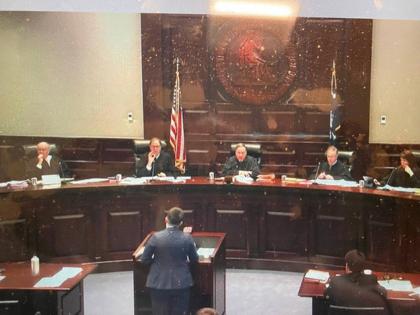Culture war issue of when women can get an abortion argued in S.C. Supreme Court
Published in Political News
COLUMBIA, S.C. — For the third time in three years, a major abortion case was before the S.C. Supreme Court on Wednesday, this time with opposing lawyers asking the justices to determine when, under state law, a fetal heartbeat becomes detectable.
Under the state’s two-year-old abortion law, abortions become illegal after a heartbeat becomes detectable.
On one side, Planned Parenthood attorney Catherine Humphreville argued that a 2023 state law regulating abortion should be interpreted to say that a fetal heartbeat can only be detected after approximately nine weeks — meaning that abortions could be legally performed up to that time.
While electrical cardio activity exists in a less developed embryo, that’s not the same as a heart that beats in a nine-week-old fetus, Humpreville told the justices. “You cannot have a fetal heartbeat when you do not have a fetal heart.”
On the other hand, attorneys for State Attorney General Alan Wilson and Gov. Henry McMaster — Thomas Hydrick and Grayson Lambert, respectively — argued that fetal heartbeats can be detected after six weeks, meaning that abortions can be performed only before that mark.
“There is an identifiable moment in time when the unborn child’s heart forms,” Hydrick told the justices, adding that occurs about five or six weeks into the pregnancy, when an “unborn child’s heart starts to perform the function of a heart.”
When abortions are legal is a crucial question on several levels.
For one thing, critics of the six-week timetable say many women don’t know they are pregnant by then, and for another, a doctor who performs an abortion at a time prohibited by law can be sentenced to prison for up to two years and fined $10,000.
The state law in question, called the Fetal Heartbeat and Protection from Abortion Act, was passed in 2023, signed by McMaster and widely believed at the time to outlaw most abortions after about six weeks from conception.
However, the bill did not specifically give a timetable for when abortions would be illegal.
Instead, the law referred to detection of a fetal heartbeat. As such, many of the arguments during Wednesday’s hearing centered on competing interpretations of scientific and medical terms — such as “embryo,” “fetus” and “crown rump length” — and events, such as when cardio electrical activity can be detected in an embryo and at a later stage when a tiny heart can be said to develop.
All justices asked questions, with Associate Justice John Cannon Few asking the most, and Associate Justice Letitia Hamilton Verdin — the newest justice and the only woman on the court — asking the fewest. At times, Associate Justice D. Garrison “Gary” Hill’s questions were barely audible to a remote video viewer, since he leaned back from his microphone.
Wednesday’s hearing was only the most recent time the state’s highest court has taken up the abortion issue.
In early 2023, a majority of justices found unconstitutional the 2021 version of the Fetal Heartbeat and Protection from Abortion Act. At the time, a differently constituted court ruled the law was a violation of the state constitution’s guarantee to the right to privacy.
Later, in May 2023, the Legislature passed a revised act, which the Supreme Court found constitutional in August 2023.
Wednesday’s hearing was in response to an appeal from a May 16, 2024, order by state Judge Judge Daniel Coble. He rejected a Planned Parenthood bid to get an injunction for the Legislature’s most recent abortion restriction law
“The legislature could not have been more clear that it intended a six-week time frame,” Coble wrote.
During Wednesday’s hearing, the only indisputable matter seemed to be Humpreville’s description of the issue as “a hot-button political case.”
_____
©2025 The State. Visit thestate.com. Distributed by Tribune Content Agency, LLC.




























































Comments